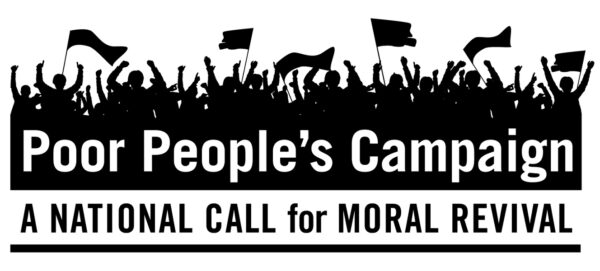PHOENIX, Ariz.—The Poor People’s Campaign held actions from sit-ins to small rallies at senators’ offices in more than 30 states on July 26, demanding that they enact a four-point program of abolishing the filibuster; raising the national minimum wage to $15 an hour; fully restoring the Voting Rights Act of 1965; and passing the For the People Act, an expansive voting-rights measure originated by the late Rep. John Lewis.

In San Francisco, protesters outside Democratic Sen. Dianne Feinstein’s local office held up a banner reading “Sen. Feinstein: Bust the Filibuster.” In Portland, Maine, four people were arrested in a sit-in at Republican Sen. Susan Collins’ office after staffers refused to answer whether she supported the four demands.
“I’ve worked at McDonald’s for 18 years and I still don’t make a living wage,” Portland protester Mindy Bergeron-Lawrence told the online rally.
The actions were leading up to a 27-mile march from Georgetown, Texas to Austin over the next five days, a rally in Austin July 31, and a large march in Washington August 2. The Georgetown-Austin march is intended “to nationalize what’s going on in Texas,“ Barber said. “Texas is the least insured, hardest to vote in, and most underpaid state in the nation.”
“Voting rights are connected to economic justice,” he emphasized, quoting Dr. Martin Luther King.
Named after the economic-justice project Dr. King was trying to launch when he was assassinated in 1968, the Poor People’s Campaign is consciously modeled on the 1960s nonviolent civil-rights movement. Rev. Barber’s rhetorical cadences and the quieter righteousness of the Rev. Liz Theoharis, its other codirector, echo the movement’s alliance of Southern black preachers and white Northern clergy.
Theoharis said the Georgetown-to-Austin march was styled after the Selma-to-Montgomery march of 1965 that led to the passage of the Voting Rights Act. Georgetown, now a suburb of Austin, was a Ku Klux Klan stronghold in the 1920s, but also the first place where Klan members were successfully prosecuted in Texas.
“This is our Selma moment,” the campaign declared.
Marchers in Phoenix sang the old movement anthem “Ain’t Gonna Let Nobody Turn Me Around,” updating it to “ain’t gonna let Donald Trump turn us around.” Marchers in Mississippi, Oregon, and South Carolina sang the old union anthem “Which Side Are You On?”
International Union of Painters and Allied Trades members joined the Phoenix march, and UNITE HERE members turned out for a rally in Boston. The Service Employees International Union and Communications Workers of America also participated.
In Jacksonville, Florida, Terri Neil spoke in front of a backdrop of the Edmund Pettus Bridge, the bridge over the Alabama River in Selma where on “Bloody Sunday” in March 1965, state troopers and a posse of vigilantes assaulted voting-rights demonstrators to prevent them from marching to Montgomery. John Lewis, then 25, suffered a fractured skull.
On Election Day in 2012, Neil said, when she and another black voter-assistance volunteer went to a polling place in Jacksonville, a white person working there closed the door and locked them out.
The voter-suppression bills enacted this year in Texas, Georgia, and other states, she said, are “the desperate last gasps of white supremacy.”
“We will build. We will fight. And we will win,” she vowed.
In Bowling Green, Kentucky, protesters sat in at Sen. Rand Paul’s office, asking whether the Republican supported the four demands, Jeremy Porter told the online rally. Five hours later, a staffer delivered the answers: Four curt “nos.’”
“How can you be against the Voting Rights Act?” Porter asked.
Rev. Barber said that Sen. Paul had at least given a clear answer instead of political “doublespeak.” “We need them on the record so we can keep them on the run,” he added.
In contrast, he noted, West Virginia Democrat Joe Manchin once supported the For the People Act — until Democrats regained control of the Senate and it actually had a chance of reaching the floor.
Manchin, who in June voted to end a filibuster of the For the People Act but said he would have voted no on the actual bill, opposes eliminating the filibuster. He also voted against raising the minimum wage to $15 in March.
“He’s listening more to the U.S. Chamber of Commerce than to the U.S. Constitution,” Barber said.

